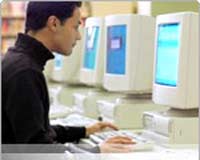8 basic principles when using a public PC
Using public computers in libraries, Internet cafes, Internet access points . is very fast, cheap and convenient. But are these computers really safe?

Safety with public computers depends greatly on user usage.Here are 8 basic principles when using a public computer, making you safer:
1. Use anti-spyware software
Download anti-spyware software ( spyware ) likeXblock.com'sX-Cleaner.This software has very small capacity, can be used immediately on a floppy disk or on USB without installation.Use anti-spyware software to scan public computers before using.That's a good idea.
2. Do not save the login information
Instead of closing the browser window or typing another web address, exit the Web ( logout ) by clicking on the button or logout link on the Web.This limits the ability of other users to access the information in the Web site you just visited.
Many programs, especially instant messengers like Yahoo Messenger, MSN, and AOL, have automatic login ( login ) to save user names and passwords, and help users not retype user name and password.This feature is only useful when used on your own computer, they will be very dangerous when used on public computers.Disable this function every time you use a public computer.
3. Password protection
The browser also has the ability to remember passwords.Before surfing the Web, if you are using Internet Explorer, select Tools -> Internet Options , in the Content tab, go to AutoComplete and uncheck all items.
Once completed, select Tools-> Internet Options . Go to the Content tab , click AutoComplete, and select Clear Forms and Clear Passwords to delete all passwords and data.
Keystroke tracking programs ( keyloggers ) can simply record your password.But they cannot be recorded if you use copy operations and paste each letter into the password.For example, if the password is "gh68 @" copy each page one character 'g', 'h', '6', '8', '@' and paste it into the password field.Although it was a bit annoying, it was safer.
4 . Do not display sensitive information on the screen
Do not let your computer display important, sensitive information such as personal information, bank account numbers, credit card numbers . When things need to go out a bit, close entire program windows, exit windows that contain sensitive information.
5 . Delete all traces
After using a public computer, delete all Internet Explorer buffer files and History lists.
To delete temporary files and History in IE, do the following:
-
In Internet Explorer , select Tools -> Internet Options
-
On the General tab, select Temporary Internet files -> Delete Files, click Delete Cookies.
-
Under History, select Clear History .
6. Don't over trust the encryption ( encryption ) capability
Currently, there are many encryption software on the market.They can be used to encrypt emails.However, these software only encrypt messages after they are ready to send mail.This is indeed quite late if a software records all keystrokes that have been installed into the device ( keylogger ).They will record the entire password and content of the written message and send it as an email to those who install the keylogger that the computer user is unaware of.
7. Pay attention around
Because there is a lot of information saying that hackers can use certain digital means to track users to steal passwords, so we should not neglect the classic attacks. this.Take a close look around and pay attention to those sitting next to each password.
8. Do not enter "sensitive" data into public computers
These methods can provide you with a way to combat the familiar behavior of hackers who will reuse these public computers after you use them.However, hackers or professional thieves can use keylogger software to steal information, email . The tools they use will disable, and steal your information easily. as soon as you have deleted all related data.
So, to be really safe, avoid typing credit card numbers, any financial information or sensitive information into public computers.That's the safest way to use it for you.
Minh Phuc
You should read it
- ★ Carefully stolen information with Trojan - How to disable Trojan
- ★ 4 potential risks of using public wifi that users should know
- ★ Clear all information on the Internet: Just go to a website
- ★ How to Access Public Folders in Outlook 2016 on PC or Mac
- ★ Learn 193.168.0.1: IP address of broadband router